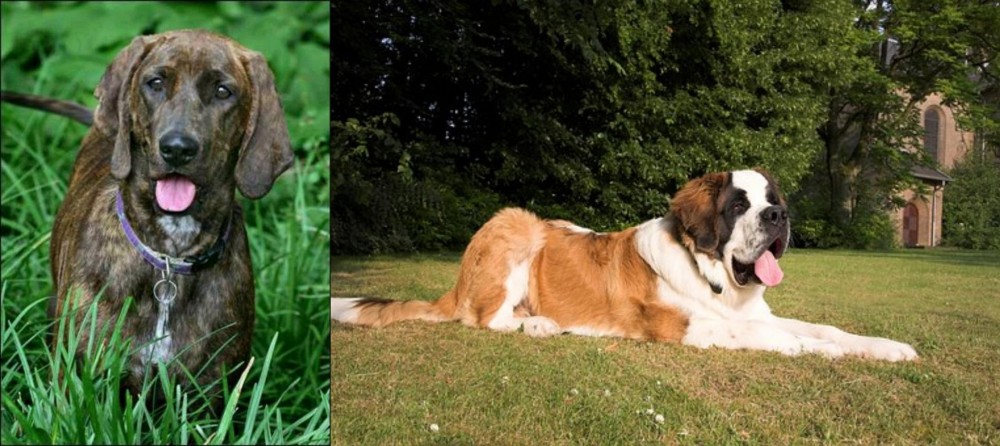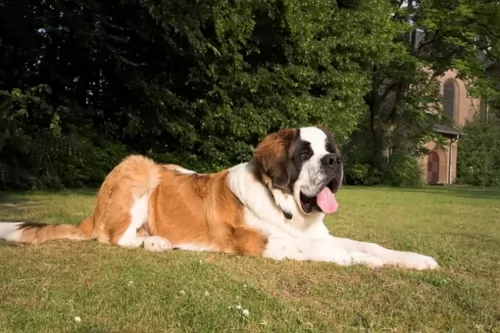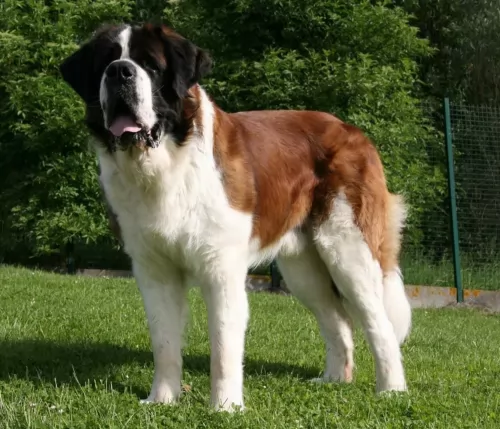 Petzlover
Petzlover Plott Hound is originated from Germany but St. Bernard is originated from Switzerland. Both Plott Hound and St. Bernard are of same height. Plott Hound may weigh 63 kg / 138 pounds lesser than St. Bernard. Plott Hound may live 4 years more than St. Bernard. Both Plott Hound and St. Bernard has almost same litter size. Plott Hound requires Low Maintenance. But St. Bernard requires High Maintenance
Plott Hound is originated from Germany but St. Bernard is originated from Switzerland. Both Plott Hound and St. Bernard are of same height. Plott Hound may weigh 63 kg / 138 pounds lesser than St. Bernard. Plott Hound may live 4 years more than St. Bernard. Both Plott Hound and St. Bernard has almost same litter size. Plott Hound requires Low Maintenance. But St. Bernard requires High Maintenance
 The Plott Hound is a scent hound who has always been used for for hunting bears. The dog may well be the state dog of North Carolina, but it isn’t well known.
The Plott Hound is a scent hound who has always been used for for hunting bears. The dog may well be the state dog of North Carolina, but it isn’t well known.
The Plott Hound is an old dog breed descending from several Hanoverian Schweisshunds which were brought to North Carolina way back in 1750. They were brought by a German immigrant, Johannes George Plott, and that is why it is believed that the dog hails from Germany.
It is believed that in the early 1900s the dog was mated with black-and-tan hounds, giving the canine additional scenting skills as well as its black-saddled brindle pattern. The dog breed has since been registered by the United Kennel Club and is also registered by the American Kennel Club.
 The St Bernard breed was once called the Alpine Cattle Dogs or the Alpine Mountain Dogs. They have always been farm dogs and mountain dogs in the French and Swiss Alps. They come from the border land of Switzerland and France. They were herding dogs, hunting, search and rescue, watchdogs and draft dogs.
The St Bernard breed was once called the Alpine Cattle Dogs or the Alpine Mountain Dogs. They have always been farm dogs and mountain dogs in the French and Swiss Alps. They come from the border land of Switzerland and France. They were herding dogs, hunting, search and rescue, watchdogs and draft dogs.
Their ancestors are considered to include the Sennenhunds and molosser breeds that came to the Alps with the ancient Romans. There are four Sennenhund breeds that are believed to have contributed to the original St. Bernard. These included the Greater Swiss Mountain Dog (Grosser Schweizer Sennenhund), the Appenzeller (Appenzeller Sennenhund), the Bernese Mountain Dog (Berner Sennenhund) and the Entlebucher Mountain Dog (Entlebucher Sennenhund) Today the St. Bernard is considered a Molossoid breed.
The first we know of the St. Bernard in any written records was in 1707 at the Great St. Bernard Pass and Great St. Bernard Hospice run by monks. There were found paintings of the dogs dating back into the late 1600’s. It is told that Barry saved upward of 100 people in the St. Bernard pass, and it is from these stories that the dogs gained their snow rescue reputation.
The St. Bernard of that time did not look like the St. Bernard does today as there was much crossbreeding. Many dogs dies during rescues in the avalanches of the mid 1800’s and so they Saint was crossed with the Newfoundland to preserve the breed. You can today see the resemblance in the build and looks of the two breeds. This cross brought about the long haired St. Bernard whose fur was too heavy for rescues.
The St. Bernards of mountain rescue fame were only about the size of a German Shepherd dog and were short haired. After crossing with the Newfoundland and moving into clubs and dogs shows, they have been bred to be much larger. Before the stud book was closed, it is thought that many larger breeds such as the Greater Swiss Mountain Dog, the English Mastiff, the Tibetan Mastiff, the Rottweiler, the Great Pyrenees, the English Bulldog, the Great Dane, the Bernese Mountain Dog, the Boxer and the Caucasian Oycharka all contributed to today’s St. Bernard.
In 1884 The Swiss St. Bernard Club was founded and the breed entered the Swiss Stud book as its first entry in 1884. It was 1888 when the standard was approved and the breed became the national dog of Switzerland. Before the name St. Bernard came to be common, these dogs might be called, Barry Dogs, Alepnmastiff, Noble Steeds or Saint Dogs.
The dogs came to England in the early 1800s and to the United States soon after. They were recognized by the European kennel clubs first and by the early 1900’s they were the most popular breed in the AKC.
 The Plott Hound is a large dog standing between 50 and 71cm in height, both male and female, and weighing in at between 18 to 27kg.
The Plott Hound is a large dog standing between 50 and 71cm in height, both male and female, and weighing in at between 18 to 27kg.
The dog’s coat is available in a number of brindle shades such as red-, blue, tan-, brown and black brindle. The ears of the dog are long and floppy and the tail is also long and held up or down, depending on whether the dog is quiet or excited. He is active and would not be recommended for a small homes in the city.
Bold, alert and intelligent, the Plott Hound is a confident, courageous and loyal pet, being somewhat aloof around strangers.
Typical of any hounds, he is a strong willed, independent dog, and this is why he will need training and socialization. These make him obedient so that he can respond to simple commands such as sit, lie down, come and stay. This makes him a pleasure to have around wherever you go with him. He is also protective, making him an excellent watchdog.
 Today’s St. Bernard is not a large dog, he is a giant dog. Weighing in at 140-200 pounds and standing 28 to 35 inches tall, he is a lot of dog. Bred with mastiffs and large mountain dogs, they have proportional and powerful build. They are strong, sturdy and well muscled. They have either a smooth or rough (short or long) coat. Their eyes are brown or occasionally blue. They have tight lids, and square heads and muzzles.
Today’s St. Bernard is not a large dog, he is a giant dog. Weighing in at 140-200 pounds and standing 28 to 35 inches tall, he is a lot of dog. Bred with mastiffs and large mountain dogs, they have proportional and powerful build. They are strong, sturdy and well muscled. They have either a smooth or rough (short or long) coat. Their eyes are brown or occasionally blue. They have tight lids, and square heads and muzzles.
There are two coat types called smooth and rough, or short and long. The smooth shorter coat is tough, flat and close against the body and the long, rough coat is dense, wavy and heavy around the legs, neck and ruff. Both types have long tails that hang low and are heavy. Saints are known to slobber, drool and snore.
 The Plott is a bold, aggressive type of dog, but he is also loving, loyal and intelligent.
The Plott is a bold, aggressive type of dog, but he is also loving, loyal and intelligent.
If you want him as a pet and companion, another bonus part is that his smooth, short coat makes him a low maintenance breed. He’s good looking too, and with training and socialization he’s going to make a great family friend, guardian and pet.
 3.Adaptability no - these are giant dogs that need a lot of room. A large fenced yard or farm is best. They won’t do well in an apartment. They need exercise every day and loping around a yard is very good for them. They love to play in the snow, carry a backpack or pull a cart. They love to have a “job”
3.Adaptability no - these are giant dogs that need a lot of room. A large fenced yard or farm is best. They won’t do well in an apartment. They need exercise every day and loping around a yard is very good for them. They love to play in the snow, carry a backpack or pull a cart. They love to have a “job”
4.Learning ability – They are smart and highly trainable if motivated. They may appear lazy but they are just laid back and need a motivation.
 Your Plott Hound is a healthy dog breed and can live to be anything from 12 to 14 years of age. Just like with any other dog breed, they are prone to certain health conditions. It is however, highly unlikely that he will get any of the diseases, but it is good to be aware of some of them -
Your Plott Hound is a healthy dog breed and can live to be anything from 12 to 14 years of age. Just like with any other dog breed, they are prone to certain health conditions. It is however, highly unlikely that he will get any of the diseases, but it is good to be aware of some of them -
There are many forms of cancer and some of the symptoms of the disease include lumps, sores that won’t heal, difficulty with breathing, lack of energy and black stools. Cancer is of course life threatening and treatments will include the likes of chemotherapy, radiation and even surgery.
This is also a deadly disease where parasites infect a dog’s heart and arteries. With a mosquito bite, dogs are exposed to larvae, and if left unchecked, the larva can develop into large worms. Your dog will be coughing, be lethargic and in a run down state. This disease certainly requires veterinary intervention.
There are so many things that can cause your dog to vomit and also have diarrhea. Eating the wrong foods, having an infection such as parvo for instance can cause a dog to vomit. An isolated case of vomiting needn’t be cause for alarm, but if your dog is vomiting repeatedly, you’ll need to get him to the vet.
This is more common in small dogs, but big dogs can easily become obese too. Being overweight has a host of negative health effects on your dog such as opening up diseases such as diabetes and putting too much stress on the joints.
 The first problem this breed faces is how fast they grow and gain weight. This can lead to serious health issues if not controlled. Their bones can be damaged by this excessively fast rate of growth. Other issues facing the breed include:
The first problem this breed faces is how fast they grow and gain weight. This can lead to serious health issues if not controlled. Their bones can be damaged by this excessively fast rate of growth. Other issues facing the breed include:
 The Plott is a hunting dog, used to being outside and used to being active and busy. For anyone who can satisfy his need to be busy, he’ll make a fantastic pet, companion and watchdog. Provide him with a variety of activities to keep him occupied – a walk, ball games, runs in the park, swimming and hikes.
The Plott is a hunting dog, used to being outside and used to being active and busy. For anyone who can satisfy his need to be busy, he’ll make a fantastic pet, companion and watchdog. Provide him with a variety of activities to keep him occupied – a walk, ball games, runs in the park, swimming and hikes.
Your Plott Hound has a short coat which sheds. He is regarded as a low maintenance dog and will require a brush twice a week. A rubber curry will keep the coat gleaming.
Check inside his ears for redness which can be indicative of an ear infection. Check his eyes too and make sure they are bright, clear and alert.
Trim your pet’s nails.
If you don’t intend to go in for breeding, have your dog neutered or spayed to avoid unwanted pups.
Provide your dog with a nice warm, dry place to sleep. When he goes outside, ensure he has both shade and sunshine to lie down in.
Make sure you feed your Plott Hound high quality food to promote longevity and good health. There are some commercially manufactured dog foods that have bad ingredients in them which can actually make your pet sick. Buy a quality food, and try to add in some homemade food too from time to time. You don’t have to make feeding your dog a complicated affair – some chopped up boiled chicken, brown rice or pasta and some vegetables such as sweet potato, carrots and spinach will keep your pet healthy and happy. You can add it into his kibble once in a while for a treat and also give him a little bit of raw meat occasionally. Easy, simple and nutritious – just like your pet wants. He doesn’t want you popping chocolate, raisins, peanuts, coffee and spicy foods into his mouth or bowl as it upsets his stomach.
Make sure he always has access to fresh, cool water.
 1.Feeding the puppy – You want to control their growth. Do not overfeed, and make sure they exercise but not too much. Feed a high quality large breed puppy food 3-4 X a day in small amounts.
1.Feeding the puppy – You want to control their growth. Do not overfeed, and make sure they exercise but not too much. Feed a high quality large breed puppy food 3-4 X a day in small amounts.
2.Feeding the adult – The problem you face with he adult St. Bernard is the potential for Bloat. Don’t over feed. Don’t feed before or after strenuous exercise. Feed 2-3 X a day in smaller amounts to prevent Bloat. Feed a high quality breed specific food if possible or an extra large breed formula.
4. Games and Exercises They need exercise but not as much as you might think. The St. Bernard is a laid back lumbering character so don’t over exercise her. They enjoy weight and cart pulling but they are not athletes who enjoy frisbee or agility. Search and rescue trials and tracking trials are perfect athletic endeavors for them.